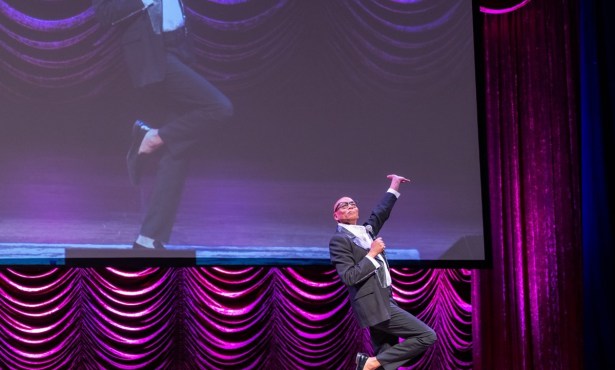‘King Bibi: The Life and Performances of Benjamin Netanyahu’
Dan Shadur’s Doc About the Rise of Israeli Prime Minister

While Israeli Prime Minister Benjamin Netanyahu is widely recognized as an important figure in global politics, his life story and vast influence on populist movements around the world aren’t often covered by the U.S media. In King Bibi, however, director Dan Shadur sheds light on the tumultuous rise and potential fall of Netanyahu, emphasizing his persistent vilification of the press and ability to rally his core. Featuring several Trump appearances and the parallels between their political approach, Shadur shows the importance and consequences of the fierce tactics of a leader such as Netanyahu.
Trump is featured in the film and seems to have endless similarities with Netanyahu regarding their media and rhetorical tactics. What do you think should be some key takeaways for a U.S. audience about the rise of Netanyahu and how it relates to the rise of Trump?
King Bibi shows Netanyahu as a pioneer when it comes to contemporary populism. Israeli mainstream media was surprised when Netanyahu first took power in 1996, since the exit polls suggested otherwise. I think there was a very deep sense of resentment and contempt towards Netanyahu and his voters, and this attitude prevented large sections of the media and the left from seeing what is actually going on. It is exactly what happened later with Brexit and the election of Donald Trump.
Netanyahu grew up as part of the Israeli elite, but for many reasons he considered himself as an outcast, and it’s a crucial element of his success. Netanyahu understood this contempt and as the years went by he understood how to use it to gain power. When a leader is using personal attacks against him as a tool to unify his base, this could be a very powerful tool. It’s very difficult to oppose it or defeat. And I guess it’s addictive. It might make you feel invincible, which is never a good thing for a leader.
How would you describe the evolution of Netanyahu’s public persona? What factors drove this?
Netanyahu’s story is fascinating because his personal story is intertwined with the public one. This was one of my main reasons for making the film. His first public appearance, as we see in the film, is during his beloved brother’s funeral. He is unknown but already filmed next to Prime Minister Rabin. It is like he’s being touched by fate — helped by the fact that his father is an historian and a story-teller himself.
Over four decades his public and personal image will blur into one — and it doesn’t seem like he wants to, or able to, separate them. Sometimes you wonder if he and his family actually exist as private human beings.
In 1993 we see Netanyahu confess of his adultery live on national TV. But he asks the viewers to believe that it’s not about him but about the fate of Israeli democracy. It’s very narcissistic and in that sense, Netanyahu is a symbol of our time, and the perfect leader for Israel. As the years go by he gains more and more control of his own image — he even controls the air conditioning everywhere he goes, so we don’t see him sweat — and at the same time the media is becoming weaker.
At the end of the film we see him sitting by himself, talking to his millions of followers in Facebook. He is very powerful but also very lonely. The obsession to tell his own story, that followed him since his first stages in politics, maybe the very reason for his downfall, as he is suspected of being bribed by media tycoons.
The film shows how Netanyahu created the first website of the prime minister’s office, a decade before social networks. How impactful do you think it is for him, or any leader, to be able to bypass the media and talk directly to their base?
I think it’s a crucial element of his leadership. I was surprised to discover that it starts so early for him. When Netanyahu records his video for the website, streaming is not even available. When it comes to dealing with the media, he is always a few steps ahead.
It seems like Netanyahu envisioned the impact of social networks 20 years before it actually happened. And as we see in the film, Trump was already listening to him back in the ’90s.
If the press is one of the crucial elements of democracy, Netanyahu and similar leaders make it obsolete. When there’s no check and balances on the truth, our leaders can portray any narrative they want to. It starts with issues of national security and economy, and goes down to their political survival.
What do you think will come of the allegations of corruption against Netanyahu, including bribery in exchange for more favorable media coverage? Where do you see Netanyahu’s story going next?
Most commentators assume Netanyahu’s reign will end in a year or two. He will probably win the upcoming election on April 9 and will have to resign if and when he is indicted for bribery. But his more adherent and loyal supporters believe he has done nothing wrong and that he should remain in power until he proves innocent in court. Netanyahu is putting all his weight and campaigning abilities into convincing Israeli public that he is right, even if it means he has to go against the legal system and the police. As we see in King Bibi, he is very talented and convincing in telling his narrative.
On top of that, Israel and the Middle East (and the whole world actually) are always on the brink of some kind of catastrophe and you never know how external events may affect the political situation. The common notion is that Bibi is done. But commentators have been wrong about him so many times in the past.
4•1•1
King Bibi: The Life and Performances of Benjamin Netanyahu screens Monday, February 4, 7:20 p.m., and Tuesday, February 5, 1 p.m., at Fiesta 5. See sbiff.org.



